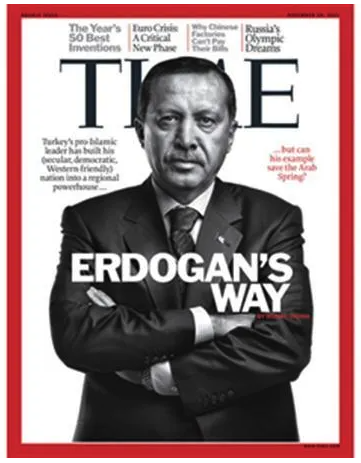Turkey may not be part of the BRICS, but it is widely regarded as one of the world’s most important and promising emerging powers. The Economist regularly refers to it as “Europe’s BRIC“. Reflecting this consensus, in his recent article in The National interest, Stephen Walt describes Turkey as a “key regional power”, putting it into one group with India and Brazil, and arguing that Turkey is bound to have significant geopolitical influence and the capacity to shape the international agenda.
EVERYBODY’S DARLING
What is more, Turkey’s rise is generally seen as a positive phenomenon – after all, it is a stable democracy. In a world where an increasing number of national leaders look to China as an economic and political model to copy, Turkey provides a powerful counterexample that political freedom is no obstacle to economic growth. The fact that democratic Turkey is part of the Muslim world makes it, in the eyes of the West, a shining example for the rest of the troubled region, and proof that Islam and democracy are not mutually exclusive.
Therefore, many were content to see Prime Minister Recep Tayyip Erdogan emerge as the most admired leader by far in the Arab World, according to the 2011 edition of the annual “Arab Public Opinion Survey” conducted by Shibley Telhami of the Brookings Institution. The survey shows that when Egyptians were asked to pick who in a list of foreign leaders they would like the next Egyptian president to look like, 38% cited Erdogan, against only 11% for Iranian President Mahmud Ahmadinejad and 8% for Saudi King Abdullah (see full article here).
Turkey’s soft power has reached quite astonishing levels. Nowadays, everybody seeks closer ties with Turkey, and in the debate about Turkey’s EU accession the main question increasingly seems not whether Europe wants Turkey, but whether dynamic Turkey is still interested in joining a faltering European Union. Turkey is one of the so-called “emerging donors” that is increasingly active in Africa, and Turkey’s government is busy establishing cultural centers around the world. In an op-ed in Today’s Zaman (a Turkish newspaper), I argued in late 2010 that Brazil and Turkey were destined to build a strong partnership, and I even suggested including Turkey into IBSA, underlining its democratic credentials. Brazil and Turkey have a lot in common regarding their willingness to assume more international leadership and their desire to reform global governance.
CLOUDS ON THE HORIZON?
It is in this context that Dani Rodrik’s recent article, entitled ‘Turkey’s Democratic Dusk’, provides a striking contrast to the accepted narrative about Turkey. Rodrik, an economics professor at the Harvard known to choose his words carefully, paints a worrisome picture about limitations to freedom of speech in his home country, raising doubts about how good a model Turkey really his to aspiring democrats in Egypt and beyond who seek to shake off their authoritarian regimes. In a similar fashion, this week’s article in The Economist questions whether Turkey should be used as an example for the Arab Spring, pointing towards the government’s authoritarian tendencies, and menioning that more journalists in Turkey are in jail than in China.
Turkey is on the way to consolidate itself as the regional hegemon and there is no reason a weakened Europe, a delegitimized America or a faraway Brazil should stop it from doing so – quite to the contrary, the world should welcome Turkey’s newfound strength, and Brazil is certainly right to make Turkey one of its principal partner in the region. In addition, Turkey’s leadership in the Arab Spring has been positive, and Prime Minister Erdogan is an important figure in stabilizing the Middle East, exercising much more constructive role than neighboring Iran. Still, as both the West and emerging powers strengthen their engagement with Turkey, they should urge Mr. Erdogan to preserve what makes Turkey such an admirable nation – its vibrant civil society, its democracy, its thinkers, and its capacity to inspire the hundreds of thousands of protesters in the region who dream of a democratic Middle East.
Read also:
Brazil and Turkey: Towards a Strategic Partnership?
For Brazil and Turkey, a Natural Defense Partnership Deepens
Turkey joins the ‘Struggle for Africa’
Turkey and Brazil: New Powers in a Transforming Global Order?











